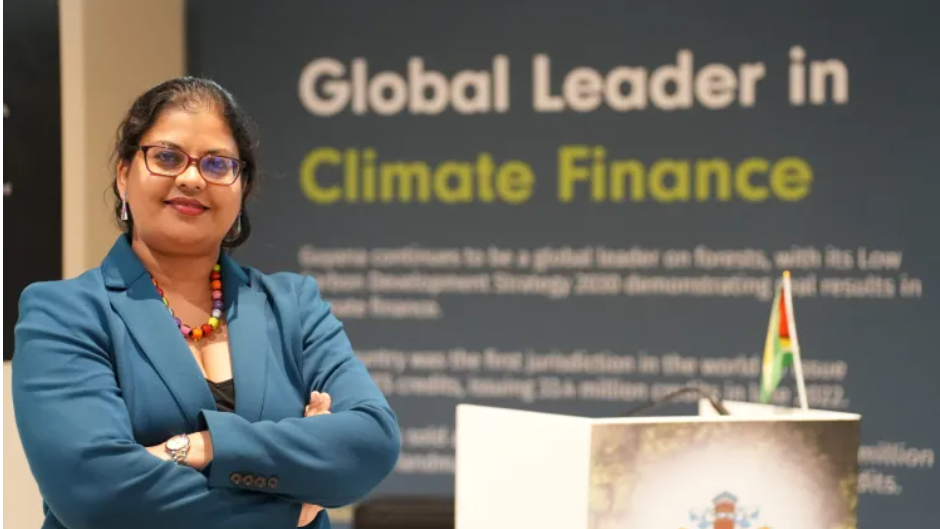By Danielle Swain in Baku, Azerbaijan
Guyana and the United Kingdom will co-chair the Forest and Climate Leaders’ Partnership (FCLP), an initiative aimed at advancing global efforts to halt and reverse deforestation by 2030.
The FCLP brings together government leaders, private-sector partners, Indigenous representatives, and civil society in a bid to address deforestation and land degradation while promoting sustainable development and rural economic transformation.
The FCLP, established as part of a broader commitment to protect forests, aims to accelerate progress toward conservation goals by offering a political platform for countries to share solutions and coordinate strategies.
“I am incredibly honoured that the UK will be taking on this leadership role alongside Guyana, a country that is home to some of the most globally significant forests and is a pioneer on forest finance,” said Ed Milliband, the UK’s Secretary of State for Energy Security and Net Zero.
Speaking at a high-level event at the ongoing 29th meeting of the Conference of Parties (COP29) of the United Nations Framework Convention on Climate Change in Baku, Azerbaijan, he added that “forests are essential for our climate, for biodiversity, for our health and prosperity, and crucially for the livelihoods of people around the world.”
The UK, under Milliband’s leadership, announced several priority areas for the partnership, including tackling illegal deforestation, strengthening forest governance, transforming supply chains, and mobilizing investment for forest protection and restoration.
Guyana’s Minister of Natural Resources, Vickram Bharrat, welcomed the role, emphasising the need for “practical pathways” to achieve ambitious conservation goals.
“The coming year will be vital for global efforts on forests, with Brazil’s hosting of the next COP bringing much-needed focus to this priority,” Bharrat stated in a news release by the FCLP.
“The good news is that forest countries and communities are not lacking in ambition – what they need is to be able to access practical pathways to realise that ambition.”
Pradeepa Bholanath, a climate economist attached to the Ministry of Natural Resources in Guyana, is attending the UN Climate Summit in Baku, and noted the acknowledgement by the UK and other countries of Guyana’s pioneering work on forests, and in showing other countries how forest conversation and sustainable forest management could be key instruments in maintaining global forest cover.

“So, Guyana looks forward to taking the co-chair position in the FCLP over the next few years and having that also be an instrument through which we engage with other countries and partner with other countries as we protect the world’s forests,” said Bholanath.
Eyes on COP30 in Brazil: A Key Moment for Global Forest Conservation
The 2025 COP30 summit, to be held in Brazil’s Amazon city of Bèlem, will serve as a milestone for forest conservation efforts, marking four years since the Glasgow Leaders’ Declaration on Forests and Land Use.
Brazil’s Minister of Environment and Climate Change, Marina Silva, announced at COP28 the creation of the Tropical Forests Forever Facility (TFFF), a mechanism aimed at channeling financial incentives toward forest preservation.
“We are moving from Baku to Bèlem and are committed to protecting tropical forests in order to conserve prosperity for future generations, so that they have the same opportunities that we have had,” Silva said.
The TFFF, scheduled for implementation by COP30, offers payments per hectare of conserved forest to countries, focusing on private financing and sovereign investments to establish a long-term fund for forest protection.
Expanding Investment and Recognising Indigenous Rights
At present, forests sequester about 20% of global carbon emissions but receive only 3% of the world’s climate mitigation finance. FCLP aims to address this imbalance by promoting financing options through mechanisms like Country Packages, forest carbon markets, and the TFFF to support national conservation targets.
Additionally, the FCLP underscores the importance of Indigenous Peoples and local communities (IP&LC) in achieving climate and biodiversity goals. Recognizing and upholding IP&LC land rights remains a focal point, with FCLP partners affirming their commitment to scaling land tenure recognition.
With high-level backing from Guyana and the UK, the FCLP will bring attention to the urgent need for coordinated action on forests, climate, and sustainable development, particularly as the countdown to COP30 begins.
(Published as part of Climate Tracker COP29 Caribbean Reporting Fellowship)
The post Guyana, UK join forces as Co-Chairs of Forest and Climate Leaders’ Partnership appeared first on News Room Guyana.